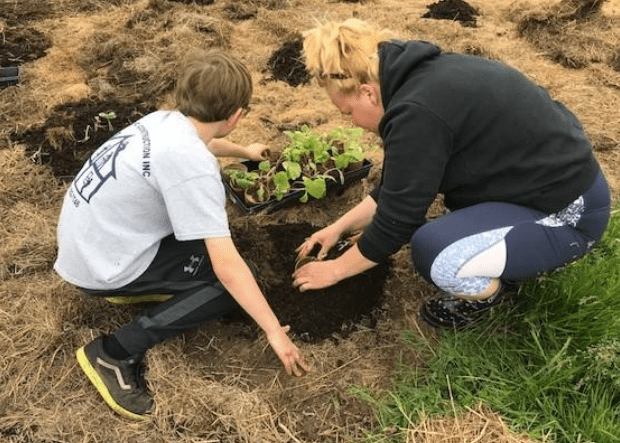By Moira M. Tidball, Cornell Cooperative Extension of Seneca County, and Keith G. Tidball, Ph.D. Cornell University, OneOp Community Capacity Building
Malnutrition and food security are critical components of community capacity and military family readiness and resilience. An important part of community capacity for military families is the ability to address food security issues from within or near the community. This is where Farm to School programs can be of use. Farm to School programs enrich students, their families, and the community by providing locally sourced foods, nutrition education, and agriculture education at primary and secondary schools. This may include activities such as school gardening, taste samples of different kinds of produce, local foods being served in the cafeteria, agriculture education, and community engagement with families.
Farm to School is a growing program across the country with over 67,000 schools participating in Farm to School, according to the USDA Food and Nutrition Services. On a national level, USDA funds Farm to School grants with over 123 grants supported for this 2022/23 school year reaching over 3.2 million students. There are also state and local level farm to school grant programs investing in this expanding program to help nourish students and support local food economies. The National Farm to School Network has resources for National Farm to School month, information about the benefits of farm to school, and finding partners in your state.
 OneOp works to continually highlight Cooperative Extension as a force multiplier in military family readiness. Cooperative Extension is an excellent pathway for Farm to School programming with its roots in agriculture, nutrition, and youth development. For example, in New York State, the Cooperative Extension system has taken an active role in providing nutrition education resources, engaging local farmers, and providing training to Farm to School stakeholders. There are numerous Cooperative Extension field locations near many of the CONUS military installations. With this proximity, Farm to School programs can provide military youth access to new kinds of healthy foods served at school, teach them about gardening, and help them understand food systems.
OneOp works to continually highlight Cooperative Extension as a force multiplier in military family readiness. Cooperative Extension is an excellent pathway for Farm to School programming with its roots in agriculture, nutrition, and youth development. For example, in New York State, the Cooperative Extension system has taken an active role in providing nutrition education resources, engaging local farmers, and providing training to Farm to School stakeholders. There are numerous Cooperative Extension field locations near many of the CONUS military installations. With this proximity, Farm to School programs can provide military youth access to new kinds of healthy foods served at school, teach them about gardening, and help them understand food systems.
Cooperative Extension also contributes community capacity enhancements in the domain of food security and military family readiness via leadership in other programs that help fight food insecurity, such as SNAP-ed and EFNEP that were mentioned in the blog post on September 16, 2022, as well as home food preservation, education about the nutritional benefits of wild game and fish, farmers market nutrition programming, and often Farm to School. Be sure to check with your local Cooperative Extension for programming that can benefit military families, and watch for future blog posts on the above topics!















